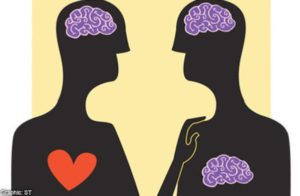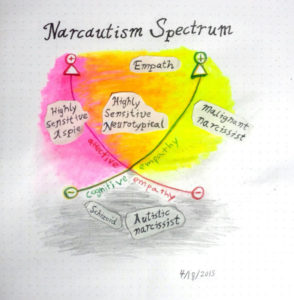The concept of malignant narcissism and HSP traits coexisting in the same person is a matter that has very little research behind it (I could find nothing at all on Google), so this article is based on my own opinions, gleaned through a combination of my readings and personal observations of the narcissists I have known. My opinion may come as a surprise.
In my article A Match Made in Hell: Narcissists and HSPs, I wrote about the tendency for narcissists and HSPs to form trauma-bonds with each other–that’s really just a fancy way of saying these two seemingly opposite types of people are often drawn to each other and become codependent on each other. The narcissist is both attracted to and repelled by the HSP’s vulnerability and high empathy. They both envy and loathe it; part of this loathing is due to the narcissist’s realization that they NEED the high empathy of the HSP because it’s good narcissistic supply and makes them feel validated. It’s also a quality that on some level (perhaps unconscious) they know they jettisoned a long time ago, and that knowledge causes them to envy and hate the HSP at the same time they depend on them. Because they hate their own vulnerability and hide it from the world (and see dependence as vulnerability) that’s another reason why they may abuse the very person who gives them a reason to exist.
The narcissist feeds off the HSP like a vampire feeds on blood. This can be an extremely unhealthy, even deadly, relationship for the HSP, who will eventually either leave the narcissist or be destroyed. But the HSP gets something out of the relationship too–the belief that through their love, they are saving the narcissist from him or herself. They often believe they can “fix” the narcissist through their empathic love and transform them into feeling human beings capable of returning what they have been given. Of course, this belief is almost guaranteed to end in disappointment (if the HSP is lucky), and possibly much worse.
The great irony here is that I think most narcissists are, way deep down, HSPs.
No, you didn’t read that wrong.
But how can that be? Narcissists are incapable of empathy, have problems feeling and expressing deep emotions, and are incapable of loving anyone but themselves. Isn’t that the opposite of being an HSP?
Well, yes and no. The explanation is complicated, so I hope you stay with me here.
As I’ve explained before, I think most narcissists began life as highly sensitive people who at an early age suffered psychological trauma due to abuse. This caused them to shut off their too-vulnerable true (authentic) selves from the world and in its place construct an elaborate defense mechanism–the false self–initially meant to protect the vulnerable true self from further harm, which has no defenses at all. Even HSPs who are not narcissists have some protective psychological armor, so they did not need to construct a false self to take the place of the true one. Healthy HSPs are truly authentic people who feel deeply and are emotionally honest with themselves and others. Narcissists were born with no emotional defenses at all; the false self replaces the true one and appears invulnerable. But this is only an illusion, because the mask is only an illusion. When you face a narcissist, you will never know who that person really is because all they will show you is the protective mask they have created. They are so terrified of further hurt that they will attack with vicious ferocity if they think you pose any threat to its flimsy underpinnings. It must be a terrifying way to live.
The high sensitivity of a narcissist is retained in the way they react to personal insults or slights. They are huge babies who overreact when they feel like they are being attacked, ignored, or they perceive their source of narcissistic supply may be in danger. They are paranoid, touchy, and utterly lacking a sense of humor, especially about themselves. They may try to appear as if they don’t care, usually through the “silent treatment” or sneaky attacks such as triangulating against or gaslighting the person they perceive as a threat, but if you know narcissism, it’s usually not too hard to see the emotional fragility behind their acts of false bravado. However, when it comes to other people, they can seem incredibly insensitive. Here’s the rub: for malignant narcissists, this isn’t really the case at all. Stay with me here.


 ed
ed 


